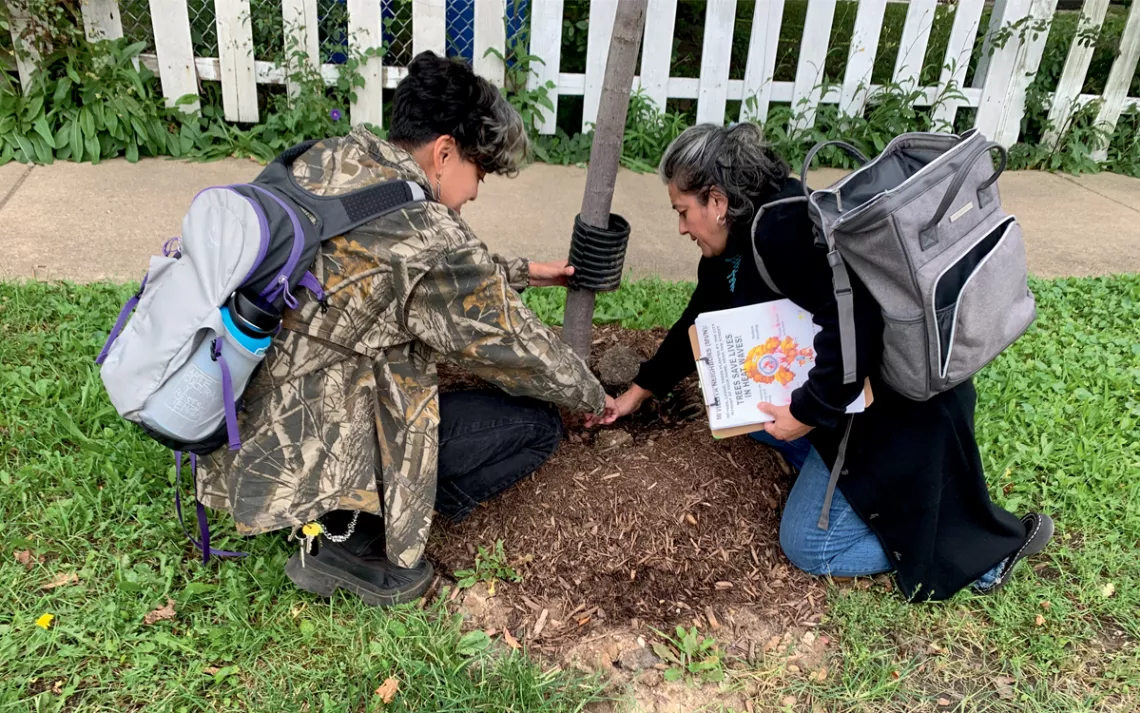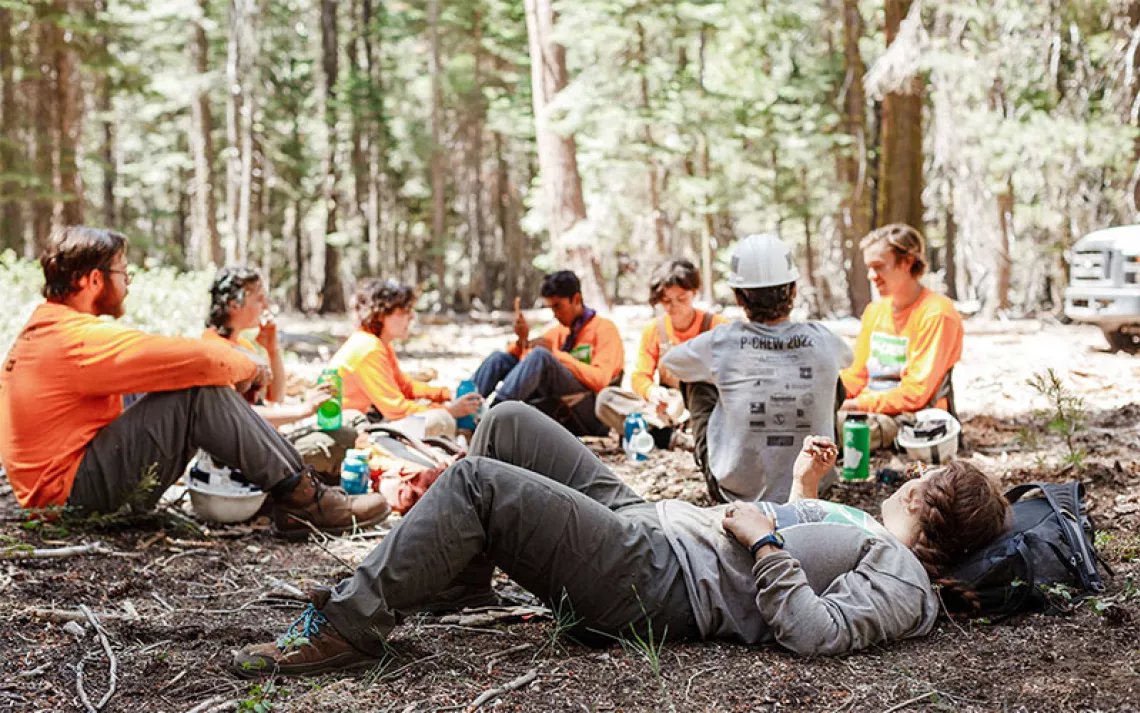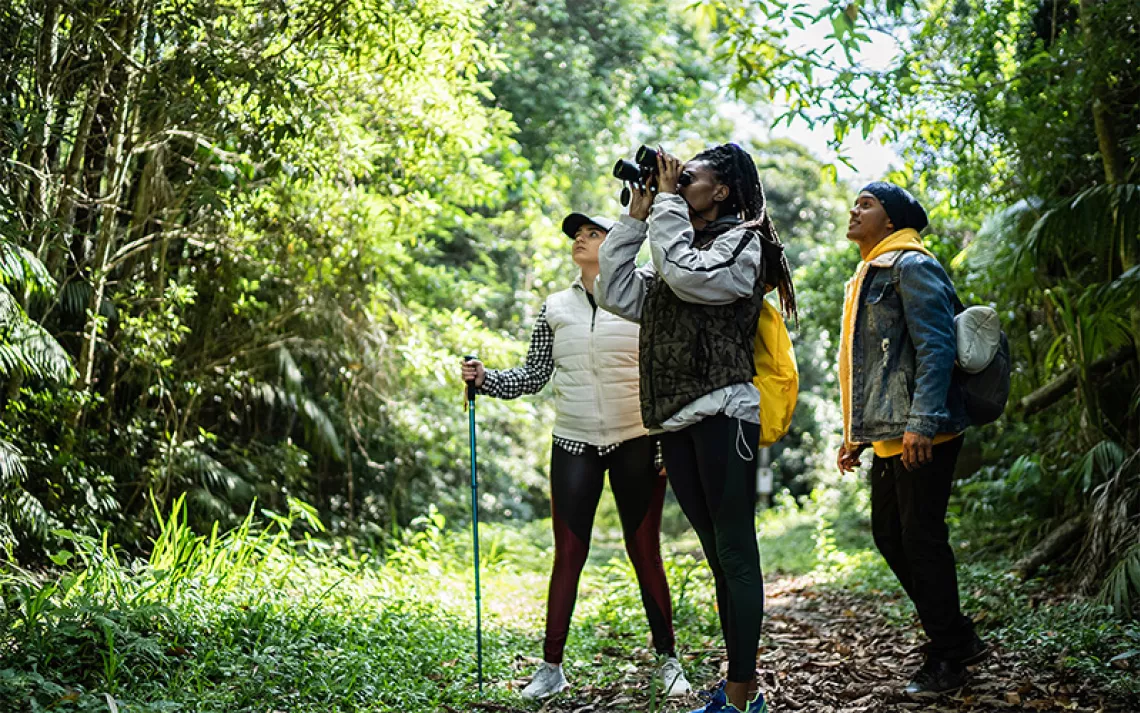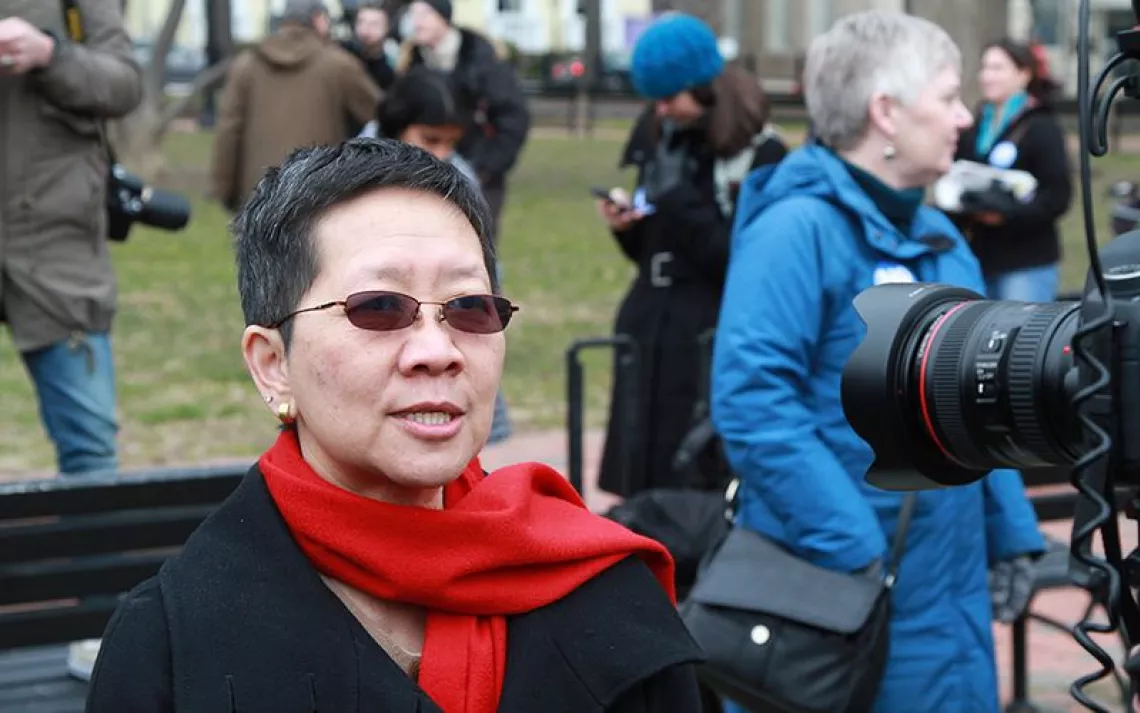How to Regreen Chicago (and Other Cities)
This local nonprofit has big dreams of a new Chicago

Citlally Fabela (left) and Dulce Garduno inspect a recently planted tree in Chicago. | Photo by Parker Yamasaki
As she walked down Troy Street in La Villita, a neighborhood on Chicago's southwest side, Dulce Garduno pulled at patio gates. "Locked," she said, shoving a bilingual flyer through. She jangled padlocks and peered into side yards. "Locked . . . locked . . ."
The block was lined with identical boxy brick homes built to house workers in the early 1900s. Maple trees shaded the sidewalk—a good sign at first glance. But Citlally Fabela, a forestry program coordinator out making the rounds with Garduno, saw warning signs that the trees might not be there for much longer. Some species of maple have a reputation for getting their roots tangled in city water infrastructure. Branches were sagging over the street—a sign that the trees had been disregarded by the city and were now a risk to anyone passing under them.
Fabela worked for Openlands, a local nonprofit with big dreams of regreening Chicago. Research has repeatedly shown that trees improve local air quality and make neighborhoods more walkable, less vulnerable to flooding, and cooler during hot weather. A recent study published in PLOS One, however, revealed inequalities in tree distribution. Blocks in low-income urban areas were over 7°F warmer than those in mid- and higher-income neighborhoods, in part because they had, on average, 15 percent less tree cover. And like many low-income neighborhoods, La Villita is surrounded by industry—factories, auto repair shops, a metal recycling plant. Improving its tree cover can't negate that pollution, but it could mitigate it. The flyers that Garduno was carrying explained how to request new trees from the city.
Their offer to help request trees was usually met with suspicion, then excitement.
Since late spring 2022, Openlands has been working in conjunction with other community groups to reach the city's goal of planting 75,000 trees over the next five years, with an emphasis on neighborhoods with the least shade. Shortly after that goal was announced, the Chicago Tribune investigated the city's tree-planting efforts and found that over the past 10 years, Chicago had lost two trees for every one planted and that even the 75,000-tree goal wouldn't be enough to replace the trees already lost. The Tribune also found that neighborhoods in the higher socioeconomic half of the city saw twice as many trees planted as those in the lower half. (In April, the Biden administration said it would make $1 billion available for tree planting in cities, as part of the community forestry provisions of the Inflation Reduction Act.)
The reasons for the neighborhood discrepancy were many—the complexities of the city's 311 nonemergency phone system, residents' distrust of city officials, language barriers. Garduno and Fabela had come to La Villita to implement the solution that seemed most practical: Speak with residents one-on-one and help them request the city tree that each was entitled to.
Fabela (who uses they/them pronouns) is tall, wears combat boots, and sports hair dyed to a faded teal. They studied wildlife biology and belong to Out in Nature, a group that hosts LGBTQIA nature events. Garduno, short and expressive, moved to Chicago from Mexico City and volunteers all over the Chicago area. She became a vocal and passionate champion of foliage after taking an Openlands TreeKeepers course in 2021. That's where she met Fabela, who taught the basics of planting, mulching, and pruning. Openlands was founded in 1963, but this was the first Spanish-language TreeKeepers course in its history.
A few houses down, Garduno spotted a man in a second-floor window and beckoned him onto his balcony. "Do you want a free tree?" Fabela asked in Spanish. The man shook his head no. "¿Porque?" Garduno asked. The man told them that he had just finished removing the tree in front of his house because it was damaging his pipes. He pointed at a mound of wet dirt where the tree once stood. He probably had a maple, Fabela explained calmly. It's true that the root systems of silver maples can be intrusive. But, they added, Openlands had a selection of over 20 species. They could send an arborist to inspect his plot, pick the best species, and plant it for him. The man, whose patio was filled with potted flowering plants, softened. He walked downstairs to continue the discussion.
Meanwhile, Garduno had spotted a couple walking at the far end of the block. "Holaaaa!" she called, her voice trailing behind her as she quickly walked toward them. "The people are more comfortable with Spanish here in this area," Garduno said after she returned. "To them I'm just like an old lady talking, talking, talking. It's better for my job, because now I understand what they need from the city."
Fabela and Garduno continued moving through the neighborhood, knocking on doors and logging spots that seemed suitable for trees into the city's 311 app. Fabela moved slowly, while Garduno dashed off and raced back. The pair greeted residents in both Spanish and English. Their offer to help request trees was usually met with suspicion, then excitement. Even Garduno admitted to feeling doubt from time to time. Ultimately, the responsibility for planting the trees rested with the city. She didn't like promising trees to residents when the city hadn't made good on other basic requests (like parking spaces for disabled residents) that had been placed years ago. But her enthusiasm for the benefits of trees overpowered her hesitation.
As the duo exited one yard, a skittish Chihuahua wriggled past and tore off down the street. Garduno rifled through the sign-up papers to find the dog owner's phone number. She spoke urgently into the receiver, then began to laugh. "The owner says the dog knows its way," she said, just as it bolted down an alley and ducked under a back gate. Then she smiled wide: "They are really excited about their tree!"
This article has been updated since publication.
 The Magazine of The Sierra Club
The Magazine of The Sierra Club



